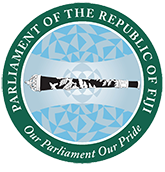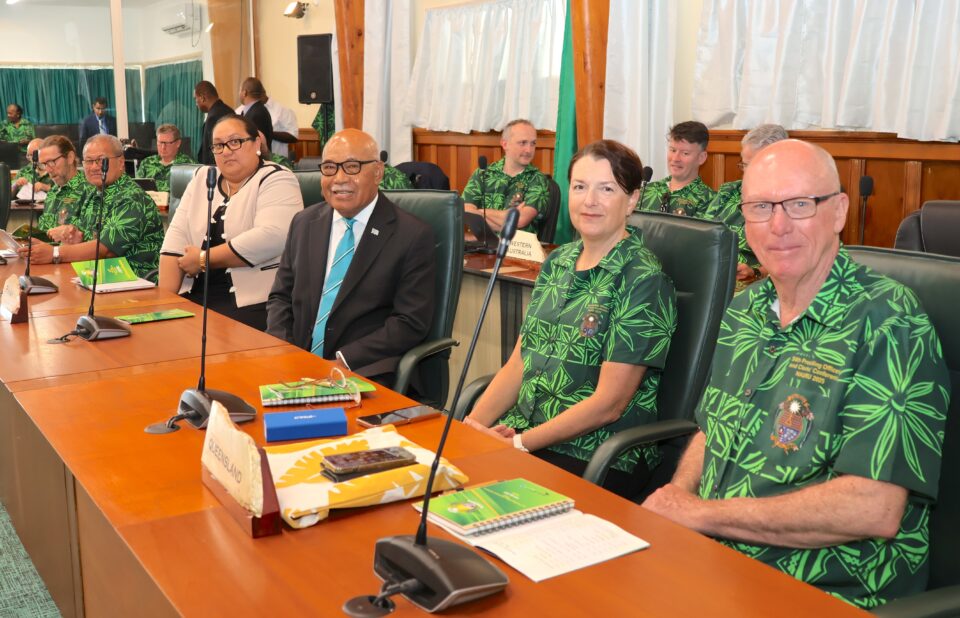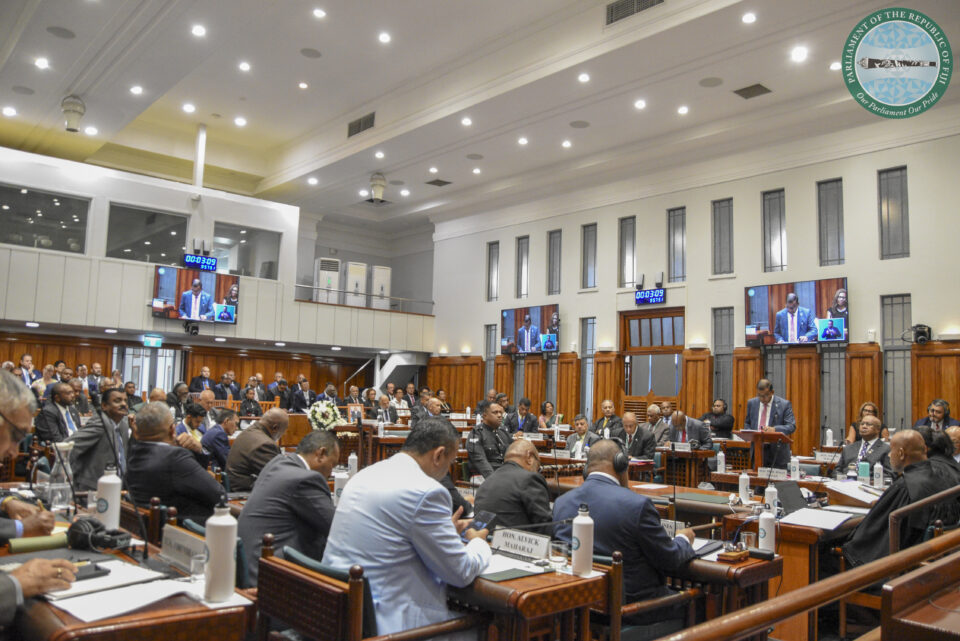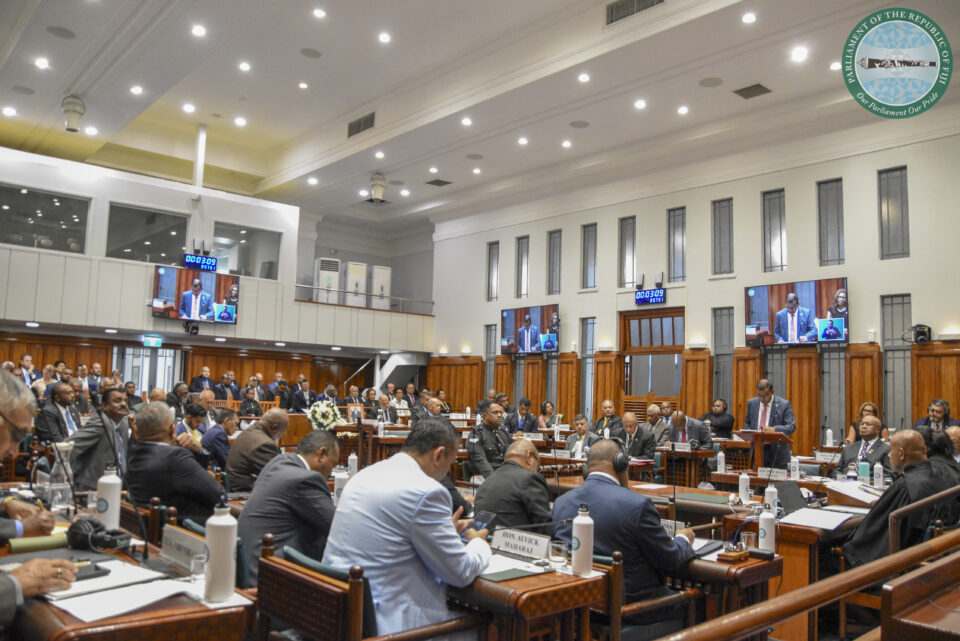International Day of Democracy – Message by the Speaker, Hon. Ratu Naiqama Lalabalavu
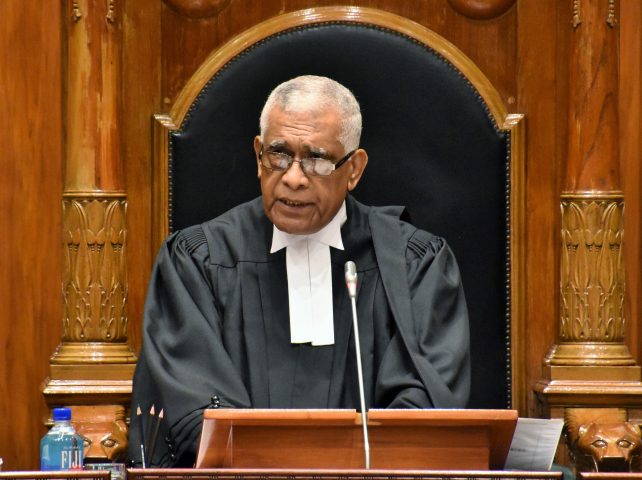
Greetings to all Fijians!
Today, we celebrate the International Day of Democracy, a momentous occasion that invites us to contemplate the bedrock principles of democracy and their enduring significance. This important day was established through a resolution adopted by the United Nations General Assembly in 2007 and has been observed annually since 2008, on the 15th of September.
As we mark this occasion, we are presented with a chance to explore the essence of democracy and assess its contemporary manifestations. It also stands as an opportune moment to propel forward the democratic spirit, fostering freedom, inclusivity, peace and the unwavering respect for human rights; hence, it is a good time to reflect on our Parliamentary representative democracy and to re-evaluate the many ways that we all participate in decision-making processes.
This year’s International Day of Democracy theme, “Empowering the Next Generation”, focuses on the essential role of children and young people in safeguarding democracy today and in the future. This theme serves as a poignant reminder that democracy is not a static concept but an evolving and dynamic force, which reminds us that true democracy is not confined to the mere act of casting a vote but encompasses a broader, participatory engagement in the governance of our nation. Fiji has a young population with more than 60 percent below the age of 40. The nation should be committed to empowering our children and youth by supporting them with investments in education, skills-building, and lifelong learning, and by providing a safe community for them.
Parliament recognises that the youths of today will be the leaders of tomorrow, and their active participation in nation building is vital to the betterment of Fiji. It encourages nurturing young voices, fostering civic education, and providing opportunities for youths to make a positive impact in their communities. Parliament’s Community Engagement Strategy is committed to educating the public, mainly young people and youths, through its ‘Parliament Bus’ and ‘Parliament’s Educational Tour’ programmes about the Parliament’s roles and functions, the works of Parliament, and how they can participate and engage with Parliament and have their voices heard. A dedicated Civic Education and Media team in Parliament is responsible for these initiatives.
Fiji, as a sovereign democratic state, is firmly grounded in the values of good governance enshrined in the Constitution, with a clear separation of powers through the legislative, executive and judicial arms of the State. Parliament, the custodian of the peoples’ will, exercises the authority to legislate, ensuring the enactment of laws that resonate with the aspirations of our diverse population.
Parliamentary democracy represents the ideal channel for the collective expression of Fijians. It provides every citizen with a platform to voice their hopes, concerns and aspirations. Within Parliament, the coalition Government commanding the majority of seats assumes the mantle of governance, with its leader designated as the Prime Minister, who appoints Cabinet Ministers to spearhead various governmental functions. Crucially, the Prime Minister and Ministers remain accountable to Parliament, ensuring that the voices of ordinary citizens are heard and heeded.
The Fijian Parliamentary democracy stands as a beacon of hope, embodying values of citizen participation, equality, human rights, political tolerance, accountability, transparency, free and fair elections every four years, the rule of law, separation of powers and equitable representation. In the contemporary context, these principles have expanded to include the imperatives of inclusivity, gender equality and the full embrace of persons with disabilities. Therefore, Parliament is dynamically responsive to the needs and demands of Fijians and enacts and amends laws as and when required.
The very essence of democracy manifests in our Parliament, an institution that encapsulates the collective voice of our nation. The Parliamentary system, a cornerstone of democracy, empowers citizens to not only select their representatives but also to engage with the governance process through active participation and vigilant oversight. This is where the role of the Opposition is crucial in keeping check and balance on the Executive or the Government.
The commemoration of the International Day of Democracy this week coincides with our Parliament sitting week – for the first time since 6 October 2014, the Parliament doors were opened and would remain open during all Parliament sittings. It was a historic week also for the Fijian Parliament as we had two issues that were put forward by the Opposition; an urgent oral question and withdrawal of a Government Bill, which were accepted by the Government – something that had not been accommodated previously. Bi-partisanship is now being displayed and I trust that this process will continue for the betterment of the Fijian people – who are the collective voice of our nation.
The Parliament of Fiji is the central institution for enabling good governance given its functions of oversight over the Executive, budget appropriation and tracking, law-making and representation. To perform these functions effectively, Parliament needs other actors; key among them is the media.
Parliament recognises that the media is the public’s watchdog, providing information to the public about how the three arms of the State, which are the Parliament, Executive and Judiciary, are undertaking their responsibilities to the people.
Parliament needs the media to inform the public on how it is conducting its functions. It also needs the media to facilitate public participation in Parliament’s functions. The Media Industry Development Act 2010 was repealed by Parliament on 6 April 2023 and this has given greater freedom to the media for its oversight role, which has been welcomed by the media industry and citizens.
The democratic process extends beyond the confines of the ballot box. It finds expression in Parliamentary debates, Committee discussions, policy reviews, and citizens’ interactions with their elected representatives. The mechanisms for scrutinising Government’s policies and actions are anchored in Parliament’s oversight role, through the work of the six Standing Committees, question time and debate on motions during plenary. Since the opening of Parliament on 3 February 2023, sixty-five annual reports have been tabled in Parliament to date, and these reports have been referred to the relevant Standing Committees to review and report back to Parliament. Since the opening of Parliament, Members of the Standing Committees were appointed and they immediately commenced with their work, and to date, some twenty-five Committee reports have been presented to Parliament.
Fiji’s Parliament upholds transparency as a fundamental principle. Its proceedings are open to the public, reaching homes through television broadcasts and online streaming. The official records of Parliamentary sessions, meticulously documented in Hansard, are readily accessible on the Parliament’s website. The participatory ethos extends further, with Parliamentary Committees inviting public submissions during the review of legislation, international treaties, annual reports and other matters of national importance.
The theme of this year’s International Day of Democracy is a powerful call to action and an invitation to all Fijians to actively participate in the democratic journey. It is an acknowledgment that democracy thrives not only in the hands of leaders but also in the voices of citizens who speak truth to power, engage with their representatives and contribute to the shaping of policies that impact our lives.
As we celebrate this day, let us be resolute in our commitment to democracy, and my appeal to all Fijians is to engage with Parliament and take advantage of the opportunities that are available whenever and wherever possible.
As such, I encourage all Fijians to come forward and participate meaningfully in decision-making.
Happy International Day of Democracy!

